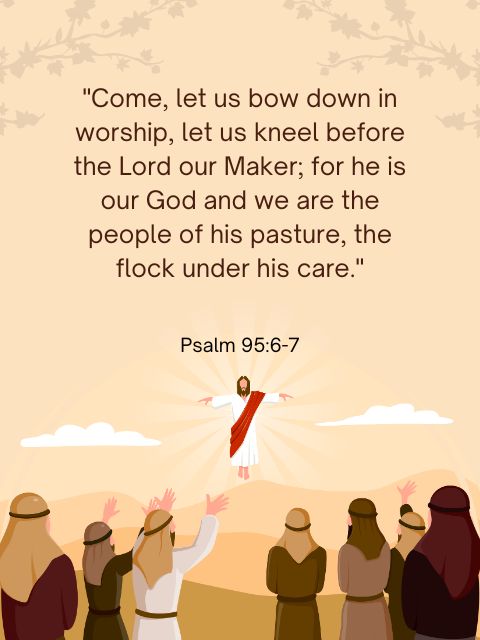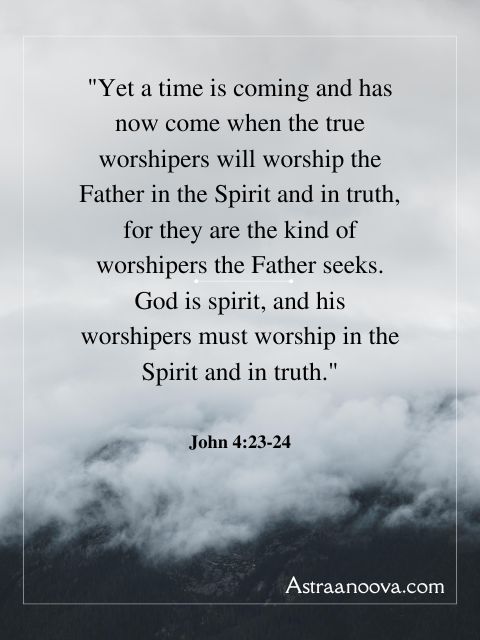In the bustling landscape of modern Christian life, worship often gets reduced to a Sunday morning ritual or a quick prayer before meals. Yet, true worship transcends these momentary interactions, representing a profound, transformative connection with the divine. Biblical worship is not merely an action but a lifestyle a continuous dialogue between the human heart and God’s eternal love.
Understanding Biblical Worship – A Transformative Journey
Worship represents more than musical performances or ritualistic practices. It’s a holistic approach to experiencing God’s presence, integrating every aspect of our existence into a sacred offering. Jesus demonstrated this radical understanding of worship, challenging traditional religious perspectives and inviting believers into a deeper, more authentic spiritual experience.
Scripture 1: Psalm 95:6-7 – Humility in Worship
“Come, let us bow down in worship, let us kneel before the Lord our Maker; for he is our God and we are the people of his pasture, the flock under his care.”

The psalmist captures a profound metaphor of divine relationship through the imagery of a shepherd and his flock. This scripture invites believers to approach God with complete humility, recognizing our fundamental dependence on divine guidance.
The shepherd-flock analogy reveals several critical spiritual insights. First, it emphasizes our vulnerability and need for constant protection. Just as sheep rely entirely on their shepherd for survival, Christians are called to trust God’s unwavering care. The act of kneeling symbolizes surrender acknowledging that our limited human understanding cannot compare to God’s infinite wisdom.
Practical Application of Psalm 95:6-7
Implementing this scripture’s wisdom requires intentional spiritual practices. Begin each morning by creating a physical posture of submission perhaps kneeling in prayer or bowing your head. These seemingly simple actions recalibrate your spiritual perspective, reminding you of God’s sovereignty.
Developing a humble heart extends beyond personal devotion. Look for opportunities to serve others, practicing the selflessness modeled by Jesus. When faced with challenges, recall the shepherd-flock metaphor. Trust that God’s guidance remains constant, even when your path seems uncertain.
Scripture 2: John 4:23-24 – Authentic Worship
“Yet a time is coming and has now come when the true worshipers will worship the Father in the Spirit and in truth, for they are the kind of worshipers the Father seeks. God is spirit, and his worshipers must worship in the Spirit and in truth.”

This profound conversation between Jesus and the Samaritan woman revolutionizes our understanding of worship. Unlike traditional religious practices confined to specific locations or rituals, authentic worship transcends physical boundaries.
“Worship in Spirit” suggests a deeply emotional, genuinely connected experience. It’s not about performing perfectly but engaging authentically with God. “Worship in truth” demands biblical understanding grounding our praise in a comprehensive knowledge of God’s character.
Practical Application of John 4:23-24
Cultivating genuine spiritual experiences requires vulnerability and continuous learning. Dedicate time to biblical study, not as an academic exercise, but as a pathway to deeper spiritual connection. Allow emotions to flow freely during worship express joy, wrestle with doubts, and celebrate God’s unchanging nature.
Developing sensitivity to divine guidance involves quieting external noise. Create sacred spaces in your daily routine where you can listen and reflect. This might mean early morning meditation, journaling, or simply sitting in contemplative silence.
Scripture 3: Romans 12:1 – Worship as Lifestyle
“Therefore, I urge you, brothers and sisters, in view of God’s mercy, to offer your bodies as a living sacrifice, holy and pleasing to God—this is your true and proper worship.”

Paul’s revolutionary concept transforms worship from a passive activity to an active, comprehensive lifestyle. The phrase “living sacrifice” challenges traditional understanding, presenting worship as a dynamic, moment-by-moment dedication of one’s entire existence to God’s purposes.
Unlike ancient sacrificial practices involving animal offerings, this approach demands a total life commitment. Every aspect of human experience professional endeavors, personal relationships, emotional landscapes becomes a potential avenue for divine worship. The metaphor of a “living sacrifice” suggests continuous, intentional surrender.
Practical Application of Romans 12:1
Integrating this scripture requires radical reimagining of daily life. Your workplace becomes a sanctuary, professional skills transform into worship tools. Ethical decision-making emerges as a spiritual discipline. Mundane moments preparing meals, commuting, interacting with colleagues can become sacred opportunities for expressing devotion.
Consider how your unique talents might serve broader community purposes. A graphic designer could create materials supporting nonprofit missions. An accountant might offer pro-bono financial guidance to struggling families. Each action becomes a nuanced expression of worship, transcending traditional religious boundaries.
Read Also >> 50 Powerful Bible Verses to Guide Your Confirmation Journey
The Profound Impact of Worship on Christian Life

Spiritual Growth through Worship
Consistent, intentional worship acts as a powerful spiritual formation mechanism. By repeatedly orienting ourselves towards divine perspectives, we gradually develop spiritual maturity. This process resembles physical training repeated actions build spiritual muscle, enhancing resilience and understanding.
Worship cultivates profound biblical comprehension. As believers engage authentically with scriptural narratives, abstract theological concepts transform into lived experiences. Complicated doctrines become personal revelations, bridging intellectual understanding and emotional connection.
Strengthening Personal Faith
Worship serves as a critical faith-building strategy, especially during challenging seasons. When external circumstances feel overwhelming, worship provides a stabilizing perspective. It reminds believers of God’s unchanging nature, offering comfort beyond immediate circumstances.
Through worship, Christians develop spiritual vocabulary for navigating complex emotional terrains. Praise becomes a powerful reframing tool, helping individuals move from victim mentalities to victor perspectives. Each worship moment becomes an opportunity for spiritual recalibration.
Building Christian Community
Corporate worship transcends individual experiences, creating profound communal connections. When believers gather, sharing authentic spiritual expressions, something transformative occurs. Mutual encouragement emerges, spiritual energy becomes contagious, and individual faith journeys intertwine.
These collective experiences generate supportive faith networks. Shared worship creates safe spaces for vulnerability, healing, and mutual growth. Community becomes more than social interaction it becomes a living, breathing manifestation of divine love.
Practical Worship Strategies for Modern Christians

Creating Meaningful Worship Routines
Developing consistent spiritual disciplines requires intentionality. Modern life’s constant distractions demand structured yet flexible approaches. Consider creating personalized worship frameworks that accommodate your unique lifestyle and spiritual temperament.
Some individuals thrive with structured morning devotionals. Others might prefer spontaneous praise moments throughout the day. The key is finding rhythms that feel authentic and sustainable, rather than imposing rigid, potentially unsustainable practices.
Overcoming Worship Challenges
Digital environments present unprecedented worship challenges. Constant notifications, information overload, and fragmented attention spans can significantly disrupt spiritual focus. Developing digital mindfulness becomes crucial for maintaining meaningful worship practices.
Consider implementing technological boundaries. Designate specific “digital detox” periods. Create physical and virtual spaces conducive to reflection and spiritual connection. Recognize that maintaining spiritual depth requires intentional resistance to constant external stimuli.
Integrating Worship into Daily Life
Transformative worship happens not just during designated spiritual moments but throughout everyday experiences. Cultivate an awareness that sees divine potential in ordinary interactions. A kind word, a moment of patience, an unexpected act of generosity each becomes a worship expression.
Develop a gratitude practice that reframes mundane experiences. When faced with challenges, ask: “How might this moment become an opportunity for spiritual growth?” This perspective shifts worship from occasional activity to continuous state of being.
Conclusion
Worship transcends religious performance. It represents a profound, ongoing dialogue between human vulnerability and divine love. The scriptures explored Psalm 95:6-7, John 4:23-24, and Romans 12:1 offer transformative perspectives that invite believers into deeper, more authentic spiritual experiences.
Your worship journey is uniquely yours. There’s no universal template, only invitation. Embrace imperfection, celebrate authenticity, and remain open to continuous spiritual formation.
Read Also >> 40 Essential Bible Verses About Judging Others Wisely
FAQ’s
Which scripture talks about worship?
The article highlights three powerful worship scriptures: Psalm 95:6-7, John 4:23-24, and Romans 12:1, each offering unique insights into authentic worship practices.
What are the three elements of worship?
Based on biblical teachings, the three core elements of worship are: humility before God, genuine spiritual connection, and total life dedication as a living sacrifice.
What is the true worship verse?
John 4:23-24 provides the most explicit definition of true worship, emphasizing worship “in Spirit and in truth” as what God ultimately seeks from believers.
What are the three reasons for worship?
The three primary reasons for worship are: spiritual growth, strengthening personal faith, and building Christian community through authentic connection with God.
Which psalm is for worship?
Psalm 95:6-7 is an exceptional worship psalm, beautifully illustrating humility, surrender, and recognizing God’s shepherding relationship with believers.
Why does God tell us to worship?
God calls us to worship to deepen our relationship with Him, transform our spiritual understanding, and align our lives with divine purpose and love.
What does John 4 verse 24 mean?
John 4:24 means that genuine worship transcends physical locations or rituals, focusing instead on heartfelt, Spirit-led connection with God’s truth.
What is worship according to Scripture?
Scripture portrays worship as a comprehensive lifestyle of surrender, not confined to church services but encompassing every aspect of daily living and dedication to God.
What is a powerful quote for worship?
Romans 12:1 offers a powerful worship quote: “Offer your bodies as a living sacrifice, holy and pleasing to God—this is your true and proper worship.”
What book of the Bible talks about worship?
While multiple biblical books discuss worship, Psalms, Romans, and the Gospel of John provide particularly profound insights into authentic worship practices.

Multilingual faith educator exploring connections between language, spirituality, and dream symbolism.


















